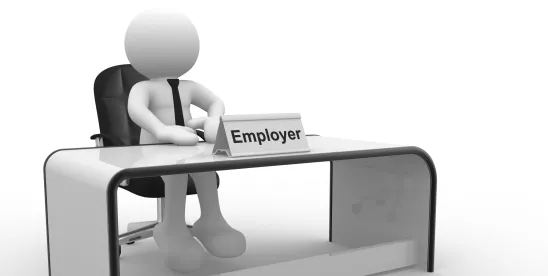Welcome and thank you for joining us for this special edition of We get work™, live from Jackson Lewis’ Workplace Horizons 2024 from the Lotte New York Palace in New York City and the Wynn in Las Vegas. What follows are high level conversations on conference programs and why they were important topics to present now.
Transcript
Welcome and thank you for joining us for this special edition of We get work™, live from Jackson Lewis’ 2024 Workplace Horizons Conference. What follows are high-level conversations, providing information on conference programs and in light of the current legal, regulatory and cultural landscape, why they were important topics to present now.
In this episode, we explore what you need to know about a variety of topics that present daily challenges for employers, especially in 2024. Eric Magnus informs us that a quarter of the workforce may no longer be FLSA exempt. Now what? Joe Lynett and Tania Mistretta answer the question, do we have to accommodate that? Laura Pierson-Scheinberg and Jon Siegel remind us why it’s critical to effectively manage union and non-union workplaces in a revitalized labor movement. And Jon Siegel, this time along with Susan Groff, talk about California, specifically how to be a successful employer in an employee-friendly state.
This afternoon, we’re sitting down with Eric Magnus, principal in the Atlanta office at Jackson Lewis. Good afternoon, Eric. Can you tell us a little bit about yourself and your practice at Jackson Lewis?
Yeah, sure. Great to be here. My practice is focused entirely on either wage and hour advice and counsel work, both federal and state law issues, and then I’m one of the co-heads of the class action practice group. So, 65, 70% of my work is defending class actions. Most of those are wage and hour cases, but not all have a lot of pay discrimination cases, other sort of discrimination cases that is an expanding part of our practice beyond wage and hour work.
The title of your presentation today is A Quarter of the Workplace May No Longer Be FLSA Exempt. Now what? Can you tell our listeners a little bit about that presentation? What was covered? And why it was important to present.
Yes, so the timing of this presentation was very important because right now the Department of Labor has told everyone that it is going to be coming out with a new final rule of a much, much higher minimum salary for all of the white collar exemptions. So the white collar exemptions are the administrative, the executive, and the professional exemption, which are by far the three most popular exemptions for employees at white collar sort of workforces in the United States. So this would be an enormous increase in the minimum salary from something or what it currently is at $684 per week to something around $1 ,055 per week. So that’s a near 40% increase. The Bureau of Labor Statistics has estimated that if that actually became the law, it would make about a little more than 25% of the U.S. workforce that is currently exempt, non-exempt if employers did nothing in response. So, the final rule is actually could come out literally while we’re sitting here or it could come out Monday, Tuesday, it’s, but it’s in the very near future. It will come out in April.
So our clients need to know how to deal with this because the correct answer is not just make everybody not exempt and pay all these people overtime that have never earned overtime. Right? So likewise, the correct alternative is not give everyone a huge raise in order to meet this exemption. So there are other strategies that can be utilized and that’s most of what we’re, what we covered in this presentation and sort of also laying out the potential legal challenges, well, not potential, the certain legal challenges that will come immediately after this rule comes out. And we’ve got good insight into what that’s going to be and the likelihood of success and the timing and what strategies employers can use to try and navigate the pending litigation that’s coming.
So to say this is going to be a major change is an understatement based on what you’ve just said. Within that, what issues in your presentation really resonated with our attendees? What did they specifically want to know?
They most want to know about the litigation because do we really have to do anything about this or can we rely upon the litigation that we know is coming to get us out of it? And the attendees are sort of biased by what happened last. This happened before. This happened at the end of the Obama administration going into the Trump administration in an election year, just like this is an election year. So what happened that time? And most of our attendees know this because they were in the same or similar roles at the time then, is the election, of course, went a certain direction and Trump won the election and that killed off the legislation. So there’s a sort of inherent bias to think that’s what’s going to happen again, because history repeats itself. Most of the attendees want to sort of rely on that knowledge base, but of course, in politics, there’s no guarantees and you have to be prepared for whatever outcome is going to come. It doesn’t mean the litigation is going to go the same way as it went last time. So most of the attendees, what they really are most interested in is our predictions on what’s going to happen.
So notwithstanding your predictions, what are some key takeaways that you provided to our attendees and you can provide to our listeners to set them up to meet what’s coming down the pike?
Yeah. The most important takeaway by far is to be prepared as if this is going to become the law, to not just be caught flat-footed. Don’t be having the attitude of, I’ll worry about this if it happens. Because if you take that attitude, you’re not gonna have enough time. So you need to be prepared as if this is going to change the law, but not actually effectuating or communicating that until you know that it is. While you wanna be prepared on the one hand, you also don’t wanna communicate to your workforce that, for example, everyone’s getting a 40% raise and then you go back on it. So you have to have contingency plans that you’re planning out ahead of time, but not actually effectuating those plans. And the instinct of a lot of the attendees, and just it’s human nature, is to wait until we know in order to plan. And that is definitely not the litigation could get shaken out days before the election. Like you just don’t know how it’ll play out. So you got to plan ahead.
Okay. So as we discussed, this is a pretty significant change since we were together last year at the conference. Were there other major developments impacting employers in this area?
This is certainly in terms of like exemptions under the Fair Labor Standards Act, this is certainly a sea change of if it actually happens as a sea change. The major developments since over the last year have really been more about trends and litigation and sort of what the class action plaintiff’s bar is paying attention to. And that we’ve certainly seen changes in.
There is increasing focus on regular rate of pay cases. Regular rate of pay cases are when employers pay non-exempt employees’ bonuses or commissions or things that are not their run of the mill hourly pay, you have to pay overtime on those amounts. And this is the Trump administration actually changed the regulations in this area to make it a lot more defined as to what has to be included in the regular rate. And the plaintiff’s bar is finally catching on that even though the per person damages in these kinds of cases tend to be very low, it’s not surprising to any of our listeners that the reason why most of these cases are brought is for attorney’s fees. So the plaintiff’s bar is caught up and those are kind of gotcha cases because they’re either correct or they’re not correct. And they’re not a lot to litigate. They can have a lot of attorney’s fee exposure and a lot of low amounts of dollars per person, but with a lot of people in those cases. So that’s been a major trend. And like I talked about at the beginning, like, for years and years and years, we really didn’t get a lot of class action discrimination cases. There’s a lot more judges willing to tolerate these cases and to let them get past initial motions to dismiss and into discovery. In particular, pay discrimination cases where there’s no evidence at all or no even allegations of intent, but just that the company’s numbers don’t look good. And like women are making less than men. There certainly are race cases too, but most of them are sex discrimination cases that, in the last year, I think we Jackson Lewis are defending more of those cases now than I think we did in the last 10 years combined. And what’s interesting is it’s not limited to the California and Illinois and Massachusetts. This is cases in Florida, Texas, Georgia, you know, places like that that are not employee hotbed litigation spots. So that’s been another thing that’s changed, I think a lot in the last year.
So it sounds like employers have a lot to contend with in this area alone, not to mention all the other subject areas we’ve been covering at the conference. So how else is Jackson Lewis, how else are lawyers that practice in this area like you, providing assistance to employers to help them in their organizations?
Yeah, so on wage and hour issues in particular, it’s very, are you doing it correctly or not? It’s not like a lot of other areas where you have to sort of guess and do a lot of analysis or like, is this protected concerted activity? That’s not an easy decision. Like people could disagree with that one administration or another changes those things. We, in my practice, it’s not really that way. Like if you do proactive audits and you’re out on top of your own policies and practices, and you know where the bodies are buried and things like that, you can be compliant. There’s a lot of work to do that because you know, you don’t know whether a manager in Pawtucket, Rhode Island is having people work off the clock. You don’t know if some manager in Kansas is giving some spot bonus to somebody. So staying on top of what’s actually going on in your organization and trying to monitor and control that, you can do this correctly. Wage and hours become ever increasing sort of state law practice because the federal law hasn’t really changed much in 80 years. Those aren’t impossible to comply with either. They’re just a matter of paying attention to it. And you certainly don’t want to be going into states without paying attention to what are the wage and hour laws in those states.
Remote work has become a big issue because you put out a job ad and someone in Illinois happens to take that job and you don’t otherwise have employees in Illinois. A lot of HR and legal departments aren’t catching, like, I now have to care about an Illinois Wage Payment and Collection Act. That is not something I’ve ever had to deal with. So it’s doable. It’s just you have to spend time doing it. And we have people that know this stuff off the top of their heads and there’s no reinventing the wheel. We know what we’re doing and we can get you in the right place. It’s just a matter of paying attention to it.
You are there to help as well as all of your other Jackson Lewis lawyers. And we thank you for stopping by today and sitting behind the podcast mic and being here at the conference. And we hope you enjoy the rest of the afternoon.
This afternoon, we’re talking to Joe Lynett and Tania Mistretta, principals in the New York City office of Jackson Lewis. Tania, Joe, would you tell us each a little bit about yourself and your practice?
Sure. I’m a principal in the New York City office and I am the co-leader of the firm’s disability leave and health management practice group.
Tania? Thank you. I’m also a principal in the New York City office and I’m one of the core members of the disability leave and health management group as well.
Joe, the title of your presentation at the conference was, Do We Have to Accommodate That? Can you provide our listening audience with a brief summary of what was covered in your presentation and why you believe it was important to present this topic at the Workplace Horizons Conference?
Sure. Just briefly, our presentation covered really the more challenging and vexing problems involving accommodating employees with disabilities. And we covered areas such as accommodating commuting restrictions, accommodating remote work requests, and new obligations under the Pregnant Workers Fairness Act to accommodate pregnancy, childbirth, and related medical conditions. The reason this topic was important is that the accommodation process is still very challenging for employers.
And with the passage and enactment and implementation of the Pregnant Workers Fairness Act, there are now even more obligations to accommodate employees. So this area remains very relevant for employers because there are still challenges that employers have with the interactive process, getting information through the interactive process and arriving at a reasonable decision on accommodations. And the obligation to provide reasonable accommodation is continuing to expand.
Given the numerous variety of accommodations covered under the ADA, what really resonated with our employers? What did they really want to know about? What are the challenges that are most impactful to them?
I think the biggest concern that employers had during our presentation were really related to obligations under the Pregnant Workers Fairness Act. What it means, what are the obligations? Because while the Pregnant Workers Fairness Act does borrow some very familiar concepts that employers are very familiar with under the ADA and Title VII and the Pregnancy Discrimination Act, they don’t quite all mesh in the same way that employers are used to administering them.
So, there were a lot of questions about the Pregnant Workers Fairness Act. The regulations have still not been finalized, but we do expect them any day now, according to some of the statements that Vice Chair Samuels made during yesterday’s plenary session. So that was principally the concern. The employer community wants to know what their obligations are under that law as understood by the EEOC.
Tania, over to you. In addition to the Pregnant Workers Fairness Act, what were other concerns that were addressed or questions raised during the presentation?
Sure. I think both under ADA disability accommodation issues as well as under the Pregnant Workers Fairness Act, we still continue to get a lot of questions, including at yesterday’s presentation on the return to work. Right. So a lot of employers are still hybrid at this point with some pushing to return to in office. So we got a lot of really great questions regarding, you know, what are the potential challenges to bringing your employees back to work if an employee is asking to continue to work remotely for a protected reason, whether it be under the ADA or under the PWFA and how employers can sort of go through that analysis and articulate an undue hardship.
We also got some interesting requests, questions, inquiries on religious accommodations. We continue to see an uptick in the religious accommodation space since the pandemic and employers are still struggling to manage those types of requests, even outside of the vaccine mandate context.
Do you think the uptick in religious accommodation requests comes from the Supreme Court case that was decided?
I don’t think it’s a coincidence. Certainly the Supreme Court’s clarification in Groff v. DeJoy has a lot of employers rethinking approaches in terms of how best to approach religious accommodation requests and how best to document undue hardship under the Groff versus DeJoy standard, which is substantial in the overall context of the employer’s business. So we did get some good questions around that topic and I expect that we’ll continue to as we see the case law develop.
Okay, thank you. So this is a lot of information and issues that employers have to deal with with accommodations. What do you believe key takeaways employers should keep in mind when addressing these issues in their own organizations?
That’s a really good question and I think it’s an issue of evolution, right? The laws in the disability leave health management accommodation space are constantly evolving as our society evolves, as our workforce evolves, right? So I think it’s really about staying on top of these issues, being proactive, getting ahead of them and making sure that employers are prepared, because these requests are going to continue to pour in. And it’s really about making sure that your policies and practices are in place and ready to address these issues as they arise.
Thank you. Joe, since last year’s conference, it feels like yesterday that we sat in the room talking about some of these issues, but it’s been a year and a lot can happen in a year. What do you think has been the most significant development affecting employers?
Oh, there have been more than one in this space for sure. Tania alluded to it or mentioned it earlier, the Groff decision, right? That was quite significant in the area of religious accommodations. The second was the EEOC’s issuance of the proposed regulations under the PWFA, which will soon be finalized. And the third, I think, almost as equally important is employers continue to try to get their employees back to work back into the office and employees are continually pushing back against that. So we’ve seen some real struggles with employers trying to manage accommodation requests to work from home.
How else, Joe, is Jackson Lewis helping employers grapple with these issues on a day-to-day basis? Well, we have a disability leave and health management practice group that’s a very mature group and it brings together a group of about 150 attorneys throughout Jackson Lewis that provides day-to-day advice and counsel on disability leave and health management matters. When the PWFA regulations are issued, we have a team already assembled to digest and explain those regulations to our clients. We usually roll out and we’ll roll out a webinar for attendees to explain in clear and practical terms what the implications are going forward to accommodating pregnant employees.
Joe, Tania, thank you so much for joining us today and I hope you enjoy the rest of the conference. Thank you.
This afternoon, I’m sitting down with Laura Pierson-Scheinberg and Jonathan Siegel, principals in the San Francisco and Orange County offices of Jackson Lewis. Can you take a moment to introduce yourself and tell me a little bit about your practice? Laura?
Hi, I’m Laura Pierson-Scheinberg and I am primarily a labor attorney. I also head up our retail industry group. And I really deal with the full life cycle of the unionization process, focusing primarily on preventative strategies and then through the whole union relationship.
Jon?
I’ve been privileged to spend my entire career with Jackson Lewis. So for the last 28 years, I’ve been doing traditional labor law, trying to help our clients in all aspects, dealing with unions and avoiding unions.
Thank you very much for being here. The title of your presentation at the conference was Effectively Managing Union and Non-Union Workplaces in a Revitalized Labor Movement. Laura, can you provide our listeners with a brief summary of what you covered in your presentation and why it was important to present this topic at Workplace Horizons?
Sure. So really, it continues to be a labor renaissance. Unions are very popular. And I don’t like to focus on the unions in particular. What I like to do is talk to our clients about positive employee relations. I want them to focus on really leaning into and providing a good employee experience. And it makes your organization stronger and better when you focus on the employee experience.
Jon, what were some of the issues that resonated with our attendees during your presentation at this year’s conference?
Well, I think the attendees took away with an understanding that it’s a new day and it’s a different labor movement. And the labor movement is revitalized, it’s creative, it’s engaged in some of the most creative, detailed social media campaigns, and that they need to change how they respond and take a more holistic, creative approach. Yeah. It’s not your parents’ labor union.
So Laura, what would you provide us as some key takeaways for our attendees here at the conference, but also for our listening audience that might be thinking about these issues and facing these issues.
Yeah, so I would just say have a plan, right? Know where your problems are. Pay attention to your hotline calls, your complaints that may come through. I call it heat map it. So looking at both the external factors of what’s going on in a particular region where you might have a location. And also what’s going on internally with your organization? Are there changes? Are there things going on that may be unpopular? Are your management doing the right thing? Are you communicating the whys and the becauses behind what your decision-making is? And do your employees feel engaged and connected to the organization?
Laura, we talked a little bit about the renaissance and the labor movement at last year’s conference. What would you say are some significant or one of the most significant developments that employers are facing in 2024 since last year?
So what I would say is that I have learned more labor law in the past six months than I have since the 23 years I’ve been doing labor law. The law has changed that much. And so it’s really important to focus on making sure you’re compliant because the game has been upped. There has been changes in that you can get a bargaining order if you violate the law in a small way. And so really there has to be better training, there has to be better strategy, there has to make sure that employees are ready. And the most that we see and that must be done today by all of our clients is please check your employee handbook and workplace policies, your code of conduct for issues that may violate the NLRA. There’s been some recent decisions just in the last few months that really make it a huge, huge game changer.
So Jon, how else is Jackson Lewis providing assistance to employers on all of the issues that touched the labor area in 2024?
Well, Jackson Lewis is on the forefront of being proactive with our clients and working with them to devise recognition programs, retention programs, training programs, to offer them through seminars, articles, blogs, webinars. We’re trying to do all kinds of creative engagement with our clients and to also have them to take a step back and say, you know, the current employees in today’s workplace receive and process information differently. And we need to raise our game. And that’s what we’re really focusing right now with our clients.
Jon, Laura, thank you so much for being here this afternoon and for sharing this information not only with our conference attendees, but our listeners. We hope you enjoy the rest of your day. Thanks.
This afternoon, we’re sitting down with Susan Groff and Jonathan Siegel, principals in our Los Angeles and Orange County offices. Susan and Jon, can you introduce yourselves and tell us a little bit about your practice?
Hi, I’m Susan Groff, nice to meet you. And I am a principal in Los Angeles. I co-lead our California Advice and Counsel Resource Group and our National Advice Team.
And my name is Jonathan Siegel, and I’m a principal in our Orange County office, formerly of LA. And I spend a lot of time working with our clients, pre-litigation, giving advice, and I’m also a traditional labor lawyer.
Jon, the title of your presentation at the conference was how to be a successful employer in an employee-friendly state like California. Can you tell our listeners just a little bit about your topic and why it was important to present at our Workplace Horizons conference?
Well, we thought it was important to put employers in a position of power where they can be successful and not be so reactive, be proactive on some of the bigger issues that employers are facing in California. And we had a great session and a lot of back and forth.
We looked at reimbursement of business expenses. We looked at designing compensation plans and also coordinating leaves. What makes it so difficult for employers to navigate California law? Well, you can’t just take the federal baseline. You have to really look at, you know, where are there the distinctions and they aren’t always intuitive and they’re usually very onerous, very pro-employee. So sometimes there’s missteps because people assume it’s the same here as it is elsewhere and it’s usually very different.
So Susan, given that disparity, what were some of the issues that resonated with attendees during your presentation? What was really important for them to know?
You know, I think first was just all the different categories of incentives we have. We went into the distinctions between commissions and bonuses and the requirements that flow from that. Remote work, you know, everyone’s interested in remote work. Well, we covered, you know, what are the expense reimbursement ramifications of that in California, which there are many. And then we also, you know, I think resonated with the employers was the changes in California sick leave for 2024. So we discuss those changes. And then of course, you know, the patchwork quilts of all the different leaves of absences we have in California and how really they’re very different and, you know, they go beyond what the FMLA requires. And that’s always shocking for employers.
Shocking and challenging, right? So Jon, given all of the challenges, what did you give to the attendees to take away? What were some of the significant key points they can take back to their organizations to help them with these challenges?
Yeah, I think a lot of the attendees left with a plan that I can be proactive, I can be thoughtful, I can be creative. I don’t just have to say, you know, compliance, compliance, compliance. Yeah, we want you to comply with the law, but we also want you to brand it for your organization and turn a compliance issue into a positive planning issue and also help with retention and recruitment. So like in our session, we talked about hybrid and remote work and we were talking about business expenses, which is not an exciting topic. People are like, ah, expenses, I love that. No, what we talked about though is, well, it’s not one size fit all. It’s these employees that have this program. What’s their usage? What’s the expectations? What are really of this type of area of the country or of this job impacts the different types of expenses that may come in? And let’s devise an approach. And so you look at the compliance of it. Hey, I don’t want to violate the law, but you also want to look at the retention of it. If you have a program that is questioned by employees, it may pass muster, but it may create a frustration and they may look elsewhere. And so we want to create something that just meets the law, but also is rewarding and actually is a tool to keep them growing in the organization. You say the word California and it strikes fear in the hearts of employers.
So Susan, how else is Jackson Lewis providing assistance to employers and their organizations on these issues?
Well, kind of dovetailing off of what Jon said, we’re here to be real business partners. So, to please pick up the phone. We’re here to partner with our clients on solutions for their business. And then of course we have our California blog. We’re the only state with our own blog. Please subscribe. It’s a wonderful resource. And we’re frequently having webinars and other programs, and that’s usually communicated through the blog. But do partner with us because there’s just no substitution for really talking through these issues.
Susan, Jon, thank you so much for taking time out to sit behind the podcast mic with us this afternoon and enjoy the rest of the conference. Thank you. Thank you.
Thank you for joining us on We get work™. Please tune into our next program where we will continue to tell you not only what’s legal, but what is effective. We get work™, is available to stream and subscribe on Apple podcasts, Google podcasts, Libsyn, Pandora, SoundCloud, Spotify, Stitcher, and YouTube. For more information on today’s topic, our presenters, and other Jackson Lewis resources, visit JacksonLewis.com. As a reminder, this material is provided for informational purposes only. It is not intended to constitute legal advice, nor does it create a client-lawyer relationship between Jackson Lewis and any recipient.









 />i
/>i
